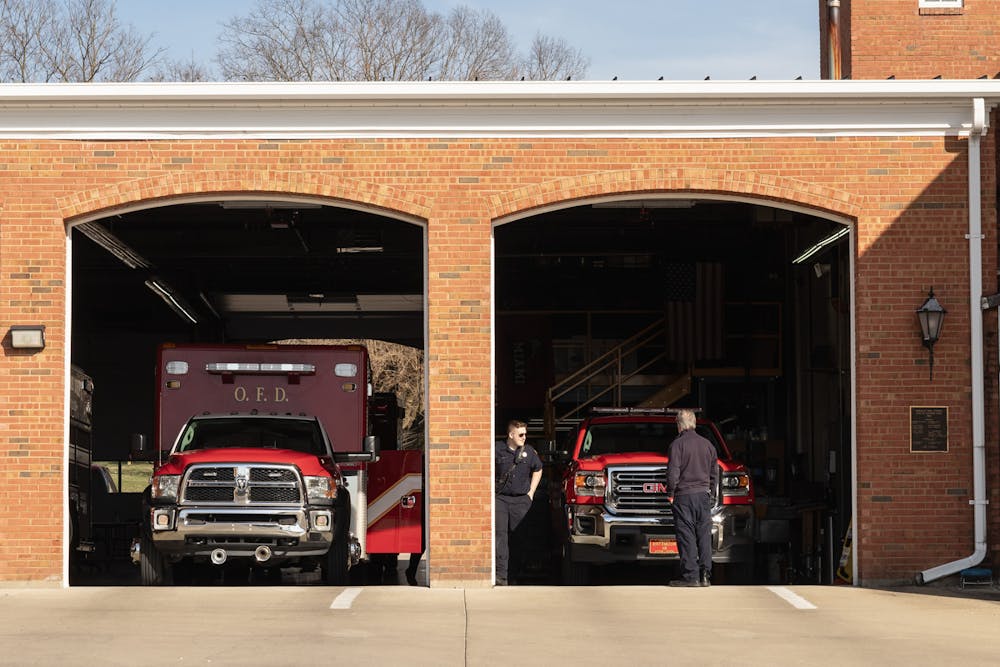Miami University reached an agreement with the city of Oxford to provide funding for the Oxford Fire Department (OFD), but it’s contingent on the approval of Issue 2. Under the deal, the university will contribute $1.27 million annually for the next 10 years to the fire department.
Issue 2 is a proposed property tax levy costing $91 per $100,000 in property value, which will be on the ballot this November. While it is a property tax, all Oxford residents, including university students, can vote on Issue 2. The levy, fixed to 2024 property appraisals, would raise $1.27 million in funding, a total which Miami will match.
The fire department has been plagued by a lack of funding over the past few years, leading to excessive work hours for its already understaffed department, a growing annual deficit and a rapidly decreasing fire and EMS fund.
Jessica Greene, Oxford’s assistant city manager, said the city has been working with the university to find common ground.
“We’ve been working with Miami for close to a year on the deficit, and knowing that they are a huge part of our community,” Greene said, “we negotiated together, and we came up with that they would give half of the deficit annually.”
Funds from both the levy and the university will go toward hiring additional firefighter and paramedic personnel and purchasing essential equipment.
David Prytherch, an Oxford city council member, said he championed the agreement after seeing the issues the department faces first-hand.
“[The] fire and EMS situation is really worrisome to us because we’ve been limping along for a number of years with bare-bones funding and staffing,” Prytherch said. “But we’re at a critical juncture where we just don't have the staff to respond to these emergencies.”
In addition to Oxford and Miami, OFD is also responsible for Oxford Township and EMS services to the western portion of Milford Township. Starting in 2025, both townships will contribute $200,000 and $60,000 respectively.
While the university is the main driver of Oxford’s economy, it is exempt from most forms of taxation due to its status as a non-profit.
“Miami agreed basically to split the deficit 50/50, which was a historic achievement in terms of cities and state universities collaborating,” Prytherch said. “State universities do not pay taxes. They don’t want to pay taxes, but Miami recognizes that it’s a key partner in this, so they met the city with [this deal] and now it’s the voters’ turn.”
In addition to splitting the fire and EMS costs with the university, Oxford has promised, in a separate agreement, to contribute $270,000 annually to economic development to increase the city’s income tax base while decreasing the city’s economic reliance on the university.
Enjoy what you're reading?
Signup for our newsletter
During 2023, Miami had 360 fire calls (33.49%) and 360 (17.18%) EMS calls, Oxford’s calls are typically exacerbated by the student population. A large portion of calls from Uptown are typically responding to student housing or emergency services on High Street, causing a large strain on the fire department’s resources.
The department answers roughly 3,200 calls a year with an on-duty staff of six fire personnel. While Fairfield Township has a similar amount of calls per year, they typically have an on-duty staff of roughly 15 personnel.
John Detherage, the Oxford fire chief, said he’s seen the results of a lack of funding over the past several years.
“We make a lot of calls at night, so the guys basically lose their first day off, which is tough, especially if you've got kids and significant others,” Detherage said. “But a lot of times, the guys are up for 24 hours, and that's where we're really struggling.”
The demanding hours have led to many veteran fire and EMS personnel, some with upwards of 10 years of experience, resigning and opting for neighboring fire departments with better hours despite less overtime pay.
If Issue 2 fails to pass, the city will be forced to take other measures. This could result in cuts across the board from all other parts of the budget except for water and sewer funds.
“It's going to be the difference between whether we’re able to serve the public or not,” Detherage said. “We’re replacing people with 10 years experience with guys that are a year out of high school, and that significantly affects your service level, and that’s probably the thing I'm most concerned about.”




